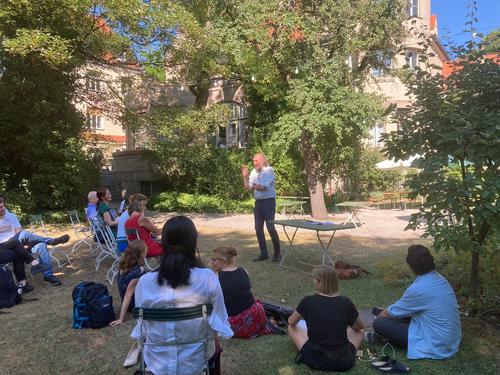Report on the Workshop "After the Crisis?—Rethinking Processes and Potentials of Change in Environment and Society"
Christof Mauch while giving his keynote, which was moved to the garden due to the warm weather.
Image Credit: Jacqueline Lorenzen
News from Sep 12, 2022
On July 22-23, 2022, the Heidelberg project “Epochal Life Words: Man, Nature and Technology in Narratives of Crisis and Change” and the Rachel Carson Center for Environment and Society in Munich co-organized a methodological workshop on “After the Crisis?—Rethinking Processes and Potentials of Change in Environment and Society”. In the beautiful Seidlvilla in Schwabing, around 20 scholars came together to discuss the action potential inherent in moments of crisis and to investigate in how far catastrophic events also provide opportunities for change. Coming from a variety of different disciplines such as history, law, literary studies or the environmental humanities, the scholars explored different strategies (e.g. journalistic, propagandistic) and narratives employed to put transformative visions into practice in spite of a crisis or due to it in its aftermath —both in the past and the present.
Using an innovative format, the workshop revolved around the sources that different disciplines use to engage with these questions. The participants therefore each introduced a specific source from their ongoing research projects (e.g., legal cases, images, statistics, archival sources, interviews) and gave insights into their specific methodological and theoretical approaches. In turn, they received valuable feedback from within the interdisciplinary panels and the general group. The specific topics that were addressed were accordingly diverse, touching upon, for example, river engineering in the Ottoman Empire, German literature of the Little Ice Age, the changing ecoscape of the Venetian lagoon, or current climate legislation in Germany. The sources exemplified the complex social and political contexts that structure how we deal with crises and indicated the powerful narratives that allow us to make sense of them (e.g., biblical apocalyptic narratives, Buddhist ontology, or climate science).
The workshop was framed by two keynotes. In his lecture, Christof Mauch, director of the RCC in Munich, re-visited his concept of “Slow Hope,” through which he had argued for the importance of narratives of incremental change to develop a more hopeful view of the future in the time of climate change. In his talk, he therefore made a plaidoyer to rewrite history by engaging with its various human and non-actors and their power relations. In the second keynote, Barbara Mittler, PI of the Heidelberg project, focused on the metaphor of the sun in Chinese cultural imaginations and artistic representations during the twentieth century. She showed how the sun was slowly transformed from an emblem of hope, which was associated with the Chinese “enlightenment” and then personally with Mao Zedong 毛澤東 (“The East is Red”), to an increasingly oppressive presence in the lives of the people – and how various actors of the cultural scene play out these tensions. Hereby, she vividly illustrated the power of images and metaphors in shaping our view of the world and instigating visions of change (or crisis).
The workshop was very well-received by all participants and it is hoped that it can be repeated in similar form next year.
Report compiled by: Matthias Schumann

